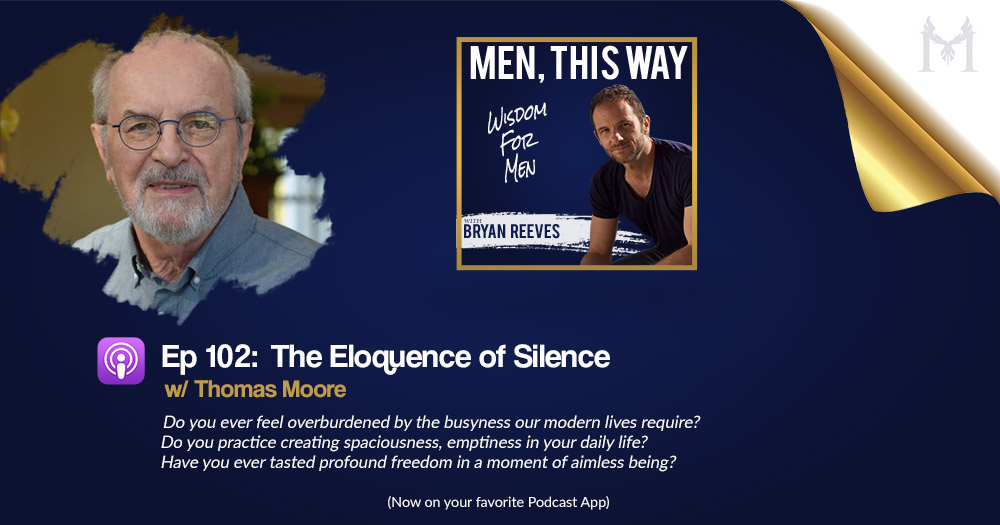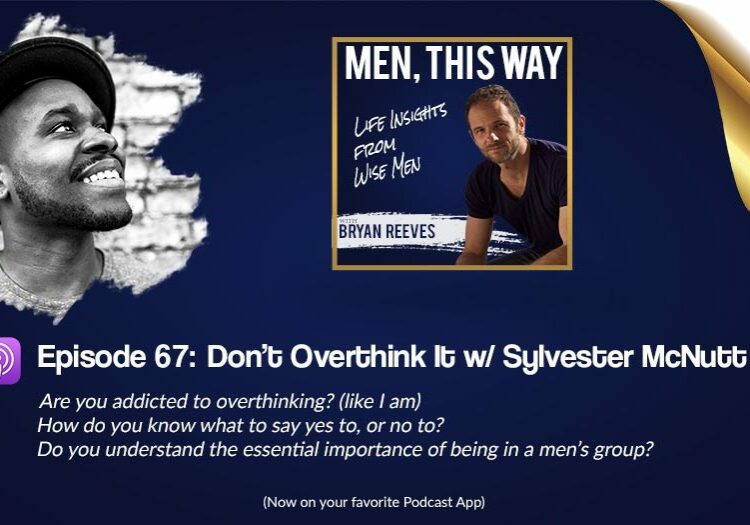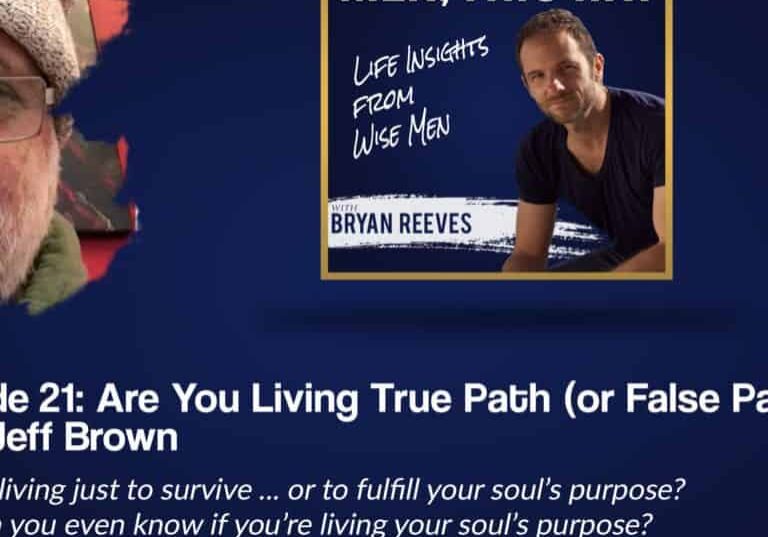Podcast: Play in new window | Download | Embed
Subscribe: Apple Podcasts | Spotify | RSS | More
Do you ever feel overburdened by the busyness our modern lives require?
Do you practice creating spaciousness, emptiness in your daily life?
Have you ever tasted profound freedom in a moment of aimless being?
Join us for a profound conversation with the esteemed Thomas Moore, a true elder in a world crowded with older men but lacking in genuine wisdom. Known for his acclaimed work (and NYT Bestseller) “Care of the Soul,” Thomas Moore’s new book “The Eloquence of Silence” delves into the surprising wisdom found within tales of emptiness. At 82 years of age, Thomas’s life journey has encompassed roles as a Catholic monk, accomplished musician, university professor, and psychotherapist, deeply influenced by figures like Carl Jung and James Hillman. His work bridges spirituality, mythology, and depth psychology, highlighting the significance of imagery and imagination in the arts.
In a world that often shies away from emptiness, Thomas Moore presents a compelling case for embracing peace as a way to navigate life’s later stages. “The Eloquence of Silence” delves into traditional stories and ideas surrounding emptiness, shedding light on the value of silence, empty space, and the art of letting go. Our conversation with this wise and gentle elder promises to be deeply enriching, offering insights that can create a meaningful difference in your life. Tune in to explore the profound depths of emptiness and its role in connecting with our daily existence. You’re sure to enjoy and find great value in this exchange with a true luminary in the field.
HIGHLIGHTS
(06:37) – Thomas discusses his career and his initial groundbreaking book “Care of the Soul.” Bryan read the book at 18 but didn’t fully grasp its depth. Thomas chronicles his path to becoming a New York Times best-selling author, a professor, and a psychotherapist.
(08:22) – Thomas recounted a pivotal moment from his youth that shaped his profound journey. During his early years, he used to go fishing with his grandfather every Sunday, fostering a special bond. One day, while they were on a big lake, an unexpected incident occurred. The boat began taking in water, and though his grandfather saved Thomas, he tragically lost his own life in the process. This experience left an indelible mark on Thomas, making him keenly aware of life’s delicate balance with mortality. This early encounter with death served as a sobering reminder. At the age of 13, Thomas embarked on a transformative path, leaving home to pursue his aspiration of becoming a Catholic priest.
(11:49) – Thomas’ journey to become a Catholic priest began at the age of 13, immersing him in a lifestyle closely resembling that of a monk. The environment at the school he attended was reminiscent of monastic life, with about 70% of its aspects reflecting the disciplined existence of a monk. Throughout this period, Thomas faced and overcome various challenges, which contributed to shaping his path towards priesthood.
(14:15) – In the context of Thomas’s journey, his father played a distinct role. While Thomas acknowledged that his father wasn’t as resilient as his mother, his father remained a steadfast pillar of support during crucial junctures, particularly when Thomas joined the Catholic school. Despite some reservations, Thomas’s father consistently backed his decisions and provided unwavering encouragement throughout his endeavours.
(16:13) – From his monastery experience, Thomas learned profound lessons that shaped his path. Reflecting on his father’s slow maturation, Thomas recognized the similarity in his own journey – a sense of not fully comprehending his actions. His father’s youthful spirit persisted until his remarkable age of 100, and similarly, Thomas experienced a childlike sense of curiosity and exploration. Although Thomas’s memories from that time are somewhat faded, he distinctly recalls a persistent drive to advance in a certain direction. This drive was fueled by his love for learning, reading, and scholarly pursuits.
(20:00) – The fusion of Thomas’s roles as a Catholic monk, university professor, and psychotherapist has moulded a unique worldview that values spiritual growth, intellectual exploration, and emotional understanding. This amalgamation, much like Thomas’s musical talents, defies simple categorization and allows for a rich and multifaceted perspective on life.
(26:05) – In a society that emphasises constant mental activity, nurturing a sense of emptiness can be challenging. Thomas highlights that tending to one’s soul often results in being viewed as unconventional. Embracing this care for the soul means not conforming, feeling out of place, and being labelled as different. Caring for your soul doesn’t align neatly with societal norms.
(29:07) – Thomas dispels a misconception surrounding the term “empty marriage” and clarifies its origin. He explains that the concept of emptiness is rooted in Buddhist philosophy, with extensive writings on the subject dating back centuries. He adds that his reference to emptiness doesn’t align with the contemporary interpretation of the term “empty.”
(39:35) – Midroll
(43:35) – Thomas shares the tale of an extraordinary archer, a master who could shoot invisible arrows. In this story, the archer’s skill lies not just in his marksmanship, but also in his ability to resist being drawn into action too quickly. Thomas uses this narrative to illustrate the modern phenomenon of burnout, where the average age of experiencing burnout is just 32. He emphasises the art of resisting the impulse to always be engaged in activity, drawing parallels between the master bow man’s skill and the importance of maintaining a sense of inner stillness in our fast-paced lives
(52:49) – Thomas reflects on the cultivation of emptiness in his own life. He explains that carving out time for emptiness requires conscious effort. Thomas recounts personal experiences of numerous flights taken for book promotions and tours. Despite the busy schedule, he recognizes that true enjoyment of life can lead to a sense of emptiness, illustrating how embracing moments of quiet and reflection can enrich our lives. Cultivating emptiness, according to Thomas, involves appreciating the stillness amidst life’s hustle and bustle
(58:53) – A gateway to practise or embrace of emptiness.Thomas illustrates the pathway towards embracing emptiness by discussing how various spiritual traditions are drawn to concrete objects that possess inherent emptiness. He shares a story from his book, where a person seeks a ring as a reminder of a departing friend. In response, the friend suggests keeping the finger empty as a symbol, highlighting the power of emptiness to evoke memories and emotions. This anecdote underscores how even the absence of something can hold great significance and serve as a gateway to practising emptiness.
(01:09:10) – Thomas’s book – The eloquence of silence. Bryan recounts a conversation with John Lee, a therapist and former guest, who was captivated by the mere title of Thomas’s book, “The Eloquence of Silence.” The book delves into the cultivation of emptiness, and Thomas encourages everyone to read it. He also shares information about where to obtain the book, emphasising its value as a guide to understanding and embracing emptiness.
(01:11:12) – Journey of your elder-hood.In a discussion with Bryan, Thomas acknowledges that despite being 82 years old, he still exudes youthful energy. He differentiates between being old and being an elder, noting that wisdom is found in only a select few. Thomas describes how he has gained a sense of authority in his elder years, allowing him to write without hesitation and with the full weight of his life’s experiences. He also expresses appreciation for meeting experts in various fields.
(01:15:21) – Thomas reflects on the worries that men in the age range of 30s to 50s often carry, noting that an undue focus on work can lead to neglecting self-care and letting go. He highlights the importance of being in touch with oneself and understanding that personal growth involves more than just professional achievements.
(01:25:31) – Thomas shares a teaching story involving Nasrudin and hunting tigers. A leader and villagers ask Nasrudin to hunt down a tiger. Instead of pursuing the tiger, Nasrudin informs his friends that the tiger has already been successfully hunted. His friends are puzzled, to which Nasrudin explains that when you hunt for tigers, none are ever scarce. This story conveys a profound message about perception and perspective.
CONNECT WITH THOMAS MOORE
Thomas’s Book – The Eloquence of Silence
Thomas’s Website – https://www.thomasmooresoul.com/
CONNECT WITH BRYAN
Instagram – @bryanreevesinsight
Youtube – @bryanreevesofficial
Facebook – @Bryanreevesofficial
Please rate & review the show on your favourite podcasting platform here: https://ratethispodcast.com/menthisway
- 0share
- 0Facebook
- 0Twitter
- 0Pinterest
- 0Email




